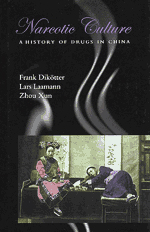Meeting the Author Night
Narcotic culture : a history of drugs in China
Speaker: Prof Frank Dikotter
Moderator: Dr Peter Cunich
Date: 24 February 2005 (Thursday)
Time: 7:15pm - 9:00pm
Venue: 1/F, New Wing, Main Library, HKU
Language: English
About the Books
 Narcotic culture : a history of drugs in China
Narcotic culture : a history of drugs in China
FROM THE PUBLISHER
"To this day, the perception persists that China was a civilization defeated by imperialist Britain's most desirable trade commodity, opium - a drug that turned the Chinese into cadaverous addicts in the iron grip of dependence. Britain, in an effort to reverse the damage caused by opium addiction, launched its own version of the "war on drugs," which lasted roughly sixty years, from 1880 to World War II and the beginning of communism. But, as Narcotic Culture brilliantly shows, the real scandal in Chinese history was not the expansion of the drug trade by Britain in the early nineteenth century, but rather the failure of the British to grasp the consequences of prohibition." In a stunning historical reversal, Frank Dikotter, Lars Laamann, and Zhou Xun tell this different story of the relationship between opium and the Chinese. They reveal that opium actually had few harmful effects on either health or longevity; in fact, it was prepared and appreciated in highly complex rituals with inbuilt constraints preventing excessive use. Opium was even used as a medicinal panacea in China before the availability of aspirin and penicillin. But as a result of the British effort to eradicate opium, the Chinese turned from the relatively benign use of that drug to heroin, morphine, cocaine, and countless other psychoactive substances. Narcotic Culture provides abundant evidence that the transition from a tolerated opium culture to a system of prohibition produced a "cure" that was far worse than the disease.
About the Speaker
 Frank Dikotter is Professor of the Modern History of China at the School of Oriental and African Studies, University of London, currently on leave as Visiting Professor at the University of Hong Kong under the Distinguished Visiting Scholars Scheme. He has produced a theoretically engaged and thematically coherent body of published work centered on the study of gender, sexuality, 'race', eugenics, drugs, crime and punishment, topics which often intersect with the history of science and medicine. By analysing these new topics from a China-centered perspective based on extensive research on original primary sources, he has undermined many of the assumptions made in the history of China about the 'imposed' nature of the modern world, showing how elites and ordinary people alike were often keen to participate in key aspects of modernity and appropriate them to suit their own perceived needs. Although most of his work concerns cultural history - loosely understood to gravitate around a reflection on the relationship between cultural representations and social experiences from a historical perspective - he has also developed an interest in cognitive history. He is interested in the ways in which social reality - including material culture and everyday life - is constructed and the ways in which ideas and things are inculturated in specific social contexts. This leads him to approach the history of China from a comparative angle which fully recognises and engages with its global dimensions. In its review of history courses a few years ago, the Independent identified his research as 'cutting edge' and named him as one of the fifteen historians in Britain it considered to be the 'stars' of the field (Independent, 3 Aug. 2000).
Frank Dikotter is Professor of the Modern History of China at the School of Oriental and African Studies, University of London, currently on leave as Visiting Professor at the University of Hong Kong under the Distinguished Visiting Scholars Scheme. He has produced a theoretically engaged and thematically coherent body of published work centered on the study of gender, sexuality, 'race', eugenics, drugs, crime and punishment, topics which often intersect with the history of science and medicine. By analysing these new topics from a China-centered perspective based on extensive research on original primary sources, he has undermined many of the assumptions made in the history of China about the 'imposed' nature of the modern world, showing how elites and ordinary people alike were often keen to participate in key aspects of modernity and appropriate them to suit their own perceived needs. Although most of his work concerns cultural history - loosely understood to gravitate around a reflection on the relationship between cultural representations and social experiences from a historical perspective - he has also developed an interest in cognitive history. He is interested in the ways in which social reality - including material culture and everyday life - is constructed and the ways in which ideas and things are inculturated in specific social contexts. This leads him to approach the history of China from a comparative angle which fully recognises and engages with its global dimensions. In its review of history courses a few years ago, the Independent identified his research as 'cutting edge' and named him as one of the fifteen historians in Britain it considered to be the 'stars' of the field (Independent, 3 Aug. 2000).

